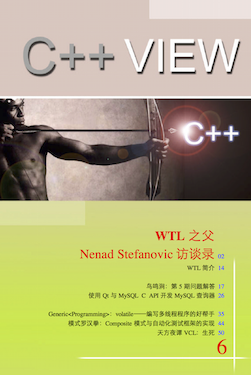lec 8: C++ intro
administrivia
no exercise before Wednesday
hw1 due tomorrow
extra office hour today 4–5
q1
why not fsync after every write?
performance
q2

- fflush (
FILE *) flushes libc cache to kernel - fsync (fd) flushes kernel cache to disk
- fsync fopen()-ed file? use
fileno()to get fd fromFILE *
q3: readdir vs readdir_r
struct dirent * readdir(DIR *dirp);simple to use; thread safety issue.
q3: readdir_r
int readdir_r(DIR *dirp, struct dirent *entry, struct dirent **result);struct dirent {
...
char d_name[256]; /* filename */
};struct dirent entry;
readdir_r(dirp, &entry, ...); /* BAD: long filename */name_max = pathconf(dirpath, _PC_NAME_MAX); /* large enough? */
size_t len = offsetof(struct dirent, d_name) + name_max + 1;
struct dirent *entryp = malloc(len); /* man readdir_r */
readdir_r(dirp, entryp, ...); /* BAD: race */today’s plan
C++ history
overview
namespace & overloading
history
desgined by Bjarne Stroustrup (wav)
1979 - C with Classes, Cpre
1983 - C++, Cfront
1990 - Annotated C++ Reference Manual, Turbo C++
1993 - Standard Template Library (STL)
1998 - C++98, first C++ standard
2011 - C++11 (C++0x), boost
2014 - C++14
C++ compilers
- early compilers: translate C++ to C
- Cpre/Cfront
- modern compilers
- gcc (g++), clang (clang++), Microsoft Visual C++, Intel’s icc, …
software written in C++
- browsers: Chrome, Firefox, Safari
- compilers: gcc, clang/llvm, v8 (javascript)
- office suites, storage, distributed systems
- OS kernels (less popular): XNU’s I/O Kit, L4
some of my college life


overview
C++ is a general purpose programming language with a bias towards systems programming that
- is a better C
- supports data abstraction
- supports object-oriented programming
- supports generic programming.
C++: a direct descendant of C
- most C syntax:
main, primitive types, pointers - still unsafe: buffer overflow, use-after-free, …
- headers: .h (some prefer .hh or .hpp)
- sources: .cc (some prefer .cpp or .cxx)
- differences
nullptr(vsNULL)new/delete(vsmalloc/free)- no need to repeat
struct - “strict” type casts
- …
classes & objects
- classes
- public, private, and protected methods and instance variables
- (multiple!) inheritance
- polymorphism
- static polymorphism: multiple functions or methods with the same name, but different argument types (overloading)
- dynamic (subtype) polymorphism: derived classes can override methods of parents, and methods will be dispatched correctly
templates
parametric polymorphism / generics
example: vector of ints, floats, and vectors of floats
vector<int> x;
vector<float> y;
vector<vector<float>> z;C++ standard library
C standard library
containers: bitset, list, queue, set, stack, hashtable, vector, …
strings & regular expressions
I/O streams
multithreading
many more …
advice on learning C++
C++ is huge and evolving
can easily hurt yourself & go wrong
get your hands dirty and write more code
use tools: compile warnings, cpplint.py, valgrind
think how each C++ feature can be implemented in C
namespace
two C++ libraries: libx and liby
- libx provides function
foo()andstruct Pair- declared in
libx.h, defined inlibx.cc
- declared in
- liby provides a different
foo()andstruct Pair- declared in
liby.h, defined inliby.cc
- declared in
test.ccincludes bothlibx.handliby.h
name conflict
$ make CXX=g++
g++ -c -o test.o test.cc
In file included from test.cc:2:
./liby.h:3:8: error: redefinition of 'Pair'
struct Pair {
^
./libx.h:3:8: note: previous definition is here
struct Pair {
^
1 error generated.C solution: add prefix: “libx_” and “liby_” to structs/functions
C++ solution: enclose structs/functions with namespace
q: what does g++ actually do?
name mangling
$ nm libx.o
... T __ZN4libx3fooEv$ nm liby.o
... T __ZN4liby3fooEvuse c++filt
$ nm libx.o | c++filt
... T libx::foo()$ nm liby.o | c++filt
... T liby::foo()g++ prepends namespace to function names
function overloading
void foo(char y) { }
void foo(int x) { }q1: does this work in C? no - conflict!
q2: how does the C++ compiler implement this?
use nm
... T __Z3fooc
... T __Z3fooiimplications
name mangling: C++ compiler changes function names
- avoid name conflicts (for namespace & overloading)
g++:void foo(int x)→__Z3fooigcc:void foo(int x)→_foo
q: is return type encoded?
q: define two C++ functions that differ only by return type?
q: compile *.cc using different C++ compilers?
use C and C++ together
- a.h: declare
void foo(void) - a.c: define
foo() - test.cc: include
a.hand callfoo()
invoke C function in C++: extern "C"
operator overloading
struct point {
int x, y;
};
point point_add(point a, point b) {
point c = {a.x + b.x, a.y + b.y};
return c;
}customize operators: +, -, <<, >>, …
improve code readability: “point_add(px, py)” vs “px + py”
be consistent & reasonable: don’t define + as -
hello 42: C vs C++
#include <stdio.h>
#include <stdlib.h>
int main(int argc, char **argv) {
const char *s = "hello";
int x = 42;
printf("%s %d\n", s, x);
return EXIT_SUCCESS;
}#include <iostream>
#include <cstdlib>
int main(int argc, char **argv) {
std::string s = "hello";
int x = 42;
std::cout << s << " " << x << std::endl;
return EXIT_SUCCESS;
}see you on Wednesday
in-class exercises
bring laptop or pen & paper